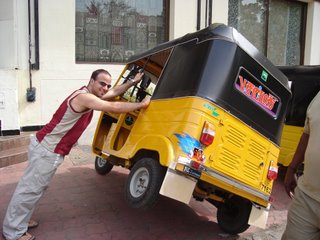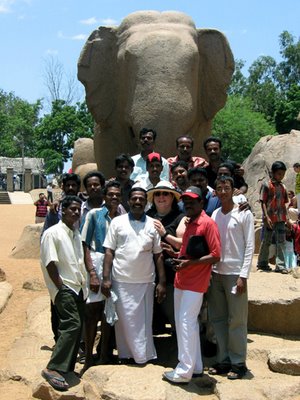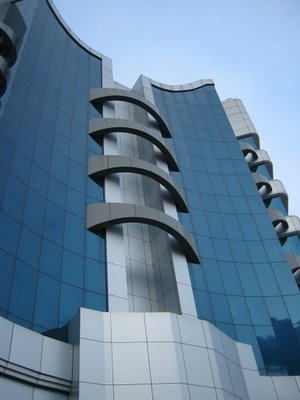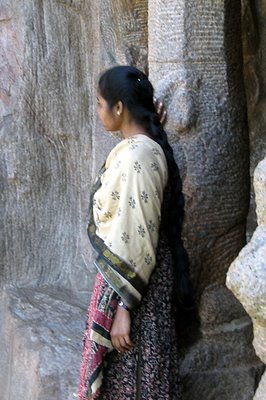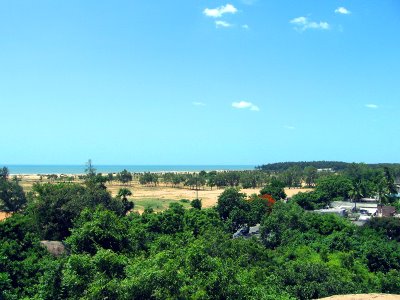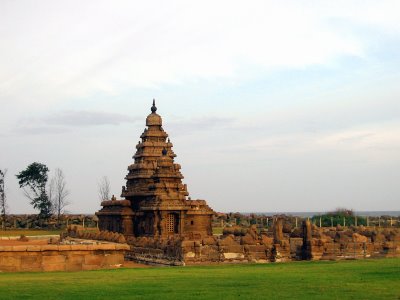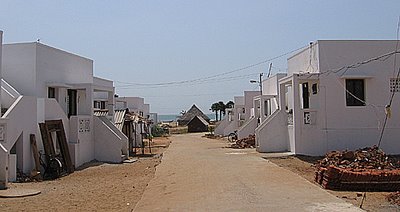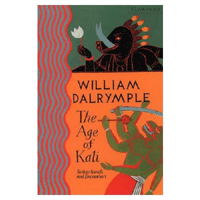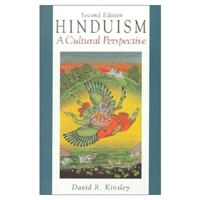You expect international trips to be long and tiring. You expect trips that you take to exotic locals to have challenges and trials along the way. What you don't expect is the point where you suddenly realize you're one Twinkie short of a box and are about to snap because there is a scorpion in your shower. But perhaps I should back up and start from the beginning.
I left my condo in Toronto at 2:45 on Tuesday, August 1. I dropped the keys for the subletter off at the front desk, climbed into an air conditioned cab and started my trip in good time and good order. I got to Pearson International Airport, and due to the fact that I was traveling alone was able to jump past the lineups of families and get checked into my flight 15 minutes after coming in the door. All was good. All was lovely. I got some food, and sat about reading and waiting for boarding.
Boarding comes, and it quickly becomes obvious that the flight is completely full. No elbow room for me. It is only when I get onto the plane, however, that I realize how little elbow room I'm actually going to have. See, they've put 6' 2", 275lb me into a bulkhead seat next to the restroom – just in the perfect place to have the restroom door hit me every time someone opens it. But it isn't like anyone is going to use the restroom on a plane with 500 passengers and a 23 hour flight, right? And, because of that whole "completely full" thing, I couldn't make them change my seat. Nor could I find anyone dumb enough to switch seats with me. I almost got this old Sikh man to do it, but at the last moment his daughter figured out what I was doing and cursed me that "my balls would burn in a demon's mouth." After that no one on the plane wanted to talk to me.
Under the best of conditions I have trouble sleeping while traveling. I can't sleep in a plane or a car, and so I knew this flight was going to be on the long side. But when you have a bathroom door hitting you in the shoulder ever 5 minutes, it's hard to do anything at all to make the tedium and annoyance go away. I'd try to read (Summerland, by Michael Chabon) and WHAM! WHAM! WHAM! would go the door, and down, down, down would go my ability to concentrate. To rub salt into the wound at one point the lovely stewardess came over and asked me to stop growling at people coming out of the bathroom. Then she asked me to stop growling at her. She was cute, so I managed to comply.
I think the only reason I survived that flight was that there was a lovely woman named Anu seated next to me. She was a Delhi native who had been living in Toronto for 9 years, and she was happy to chat with me the whole flight about Delhi and India and moving to Toronto and everything else under the sun. She also gave me her phone number so that when I get back home I can call her when I want Indian food, as it turns out her family owns the fanciest Indian Restaurant in town. Of course, I lost the number.
But what about the views? Well let me tell you, that was something. I was flying over Newfoundland, London, Paris, Zurich, the ancient Zagros Mountains and Hindu Kush. Places historic and cultural, known for their beauty and majesty. Because I love you all, I will share pictures of these views.
Paris
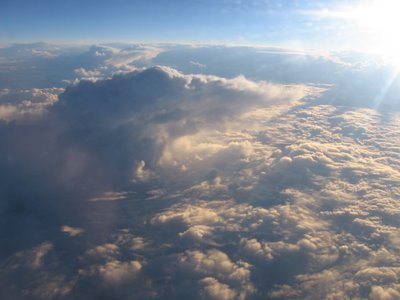
Zurich

Iran

Ah, the memories.
All good things must end, but despite that my flight ended too. I came into Delhi at Indira Gandhi International Airport at 11:30 pm on Wednesday August 2. All I had to do was wait 10 hours, make it to the Domestic Terminal, and catch my flight to Chennai and all would be well. I was tired and strung out, yes, and had a huge bruise on my shoulder, but here I was in India and everything would be good. Until I remembered customs.
Everyone who has been to India warned me about customs in Delhi. It is a nightmare, they said, both in and out of the country. You can expect 3 hour lines and then to have every item in your luggage inspected, cataloged, and probed. The reality, however, was me being waved through by a bored looking guard who didn't even bother to look at my declarations slip. I just flew by, and figured that the worst of everything was over.
Never figure this. Ever. It never is. In fact, I think that it is some sort of taunt to the demons that control shit travel experiences to assume that the worst is over, for the moment you do is the moment they go into overdrive.
While wheeling my luggage about in the airport, looking for a money exchange and the pre-paid taxi service that the Lonely Planet guide assures me will be easy to find, I somehow make a grave error. I step, for one second, over the line between the arrivals area and the visitors lounge. In that moment I cross from the sane world into the world of half-awake nightmares.
You know those moments in movies where they show that the protagonist is going through an intense emotional experience such as extended insomnia or a near-psychotic break by doing strange things with the film speed? Cranking it up then slowing it down, dragging the shutter so that everything that moves leaves a blurred trail behind it, shifting to odd lens types so that everything is off center and out of focus? Well, it turns out that 24 hours without sleep, with naught but airplane food to eat, and the confusion of a huge and massively crowded airport terminal are the magical formula to turn your real life perceptions into just such a montage.
So, I stepped over the line. I went to step back. A man with a machine gun steps into my way and screams at me in Hindi, pointing me out the door and gesturing with the barrel of his gun. Not wanting to taunt happy fun Hindi, I go out the door and find myself in the parking lot. Then the taxi drivers jump me. 15 of them see my white skin, startled and vulnerable face, and obvious tourist outfit and start to holler, "OH SIR, GOOD SIR, DO YOU NEED A TAXI SIR!" They press in around me, forming a demented football huddle in which I'm the quarterback trying to call a play to a group of loud men with mustaches. I back up away from them, putting them off as well I can with statements of how I'm going to take the bus (to which they reply that there is no bus, it blew up) and make for another door back into the terminal.
Getting there, another man with a machine gun tells me that there is a 60 rupee fee to enter the airport. I explain that I have no rupees, only American dollars, and he gives me the hairy eyeball and allows me to go to the Thomas Cook counter to change my money – so long as I take an armed escort with me. My escort packed both Uzis and breasts, and both of them looked like the could kill you seven times before you hit the floor. The guys at the Thomas Cook place don't even blink when I show up followed by two women in military uniform, both carrying SMGs. I get the impression that it happens all the time. I get my money, all in large notes, and go back to give the guard a 100. He takes it, gives me a receipt and no change, and then looks at me flatly for a moment. When I go to ask for my change he says in a very low voice, "There is nothing else, right, sir?"
If I were a braver man, or if I had been in a sane mode of mind I might have said something cool like, "Yes, some honesty in the way you run this airport." But what I said was "No" and then walked away. He and the two babes with Uzis split the extra 40 rupees up between them before I'd even gotten out of sight.
I found the taxi stand, and was immediately told that I needed to check into a hotel for the night, as the domestic airport closes at midnight. Now this scam I knew about, and so I told them off and asked that they please just take me where I wanted to go. So they asked for 1000 rupees, and I smartly argued them down to 450. I later found out that the standard fee between terminals is like 100, but it felt good at the moment. This lesson shall remain with me: in India, when you haggle you have to actually be fully awake and sane if you hope to get a good price.
The taxi ride is long and dark, with a wiry little man who doesn't speak to me the whole trip. His boss loaded me and the luggage into the car, and was as polite as anyone you'd ever meet. (He should be, considering what I was paying him.) But the actual driver? He only spoke four words to me, and those were as soon as we pulled away from the international terminal: "I don't like you." After that it was 15 minutes with him going the wrong way down a highway, playing chicken with semi trucks, and me wondering if I was going to end up on the news.
Luckily I get dropped at the domestic airport without any machete action happening, and as I pull my bags out the driver says to me, "I don't like you" and then drives off before I can tip him. (Considering what taxi drivers here normally do for a tip, I guess that means that he very much did not like me.) I am then very aware that no one is moving around the airport, and all the lights inside are out. As it turns out the scam was not a scam – the Delhi airport really does close at midnight. It also happens to be not next to anything visible in the dark of the night, just a long black stretch of road along which things with eyes bright and reflective in the darkness lurked.
I got my bags to the door where another guard with a machine gun waited for me, looking not impressed. I told him I had no money, and that I had a flight leaving in the morning. I asked if I could stay in the airport until then. He eyed me, he checked my passport, my ticket, my boarding pass for the flight I'd just come into India on, then made me stand next to another guard to see if I was taller than him, and then laughed and took 50 rupees from the other when it turned out he was shorter than me. After this the let me into the airport, telling me to keep quiet and out of the way. They pointed me to an isolated corner, and when I got there I found a Swiss family camped out, hiding between the snack bar and the bathrooms. They hushed me when I tried to speak to them and told me, "We are not supposed to be here. Do not speak."
Having been so shunned, I tried to sleep. But the cleaning crews were coming through at that point, and the airport got very loud and stayed that way for hours. Around 3 in the morning the guards started letting other people in as well, and soon it was too crowded to even lie down, and my ability to end the pain that was growing in my brain was quashed. In a haze I wandered into the bathroom, to find to my joy that they were Indian style bathrooms.
For those that don't know what an Indian style bathroom is, it is a fancy hold in the ground with a little tap so that you can wash off your left hand after you've squatted, pooed, and wiped yourself with said hand. Being beyond caring, I found that it's less gross than you'd think, but that its much harder to keep your balance than would be expected. I washed my hands thoroughly afterwards, and that's when I spotted the shower.
How lovely a shower would be, I thought. It would refresh me and cleanse the sweat and grime of 36 hours of solid travel in the same clothes. So I went over to the shower and found that there were a few problems. First, it had no latch or lock on the door. Second, it was full of slime. A think grey slime that completely coated the back wall. Third, there was the scorpion.
Yes, you heard right. It was large and black and running about in a very agitated manner in the little hole that formed the drain for the shower. I decided, at that moment, that I was not going to enter the cave of death and returned to the terminal sans shower.
After that I remember having a discussion about religion with a man from Rome, who was Buddhist, and a man from Banglore, who was Roman Catholic. I tried to tell them about being LDS, and then realized that the whole thing was turning into a joke and stopped. I'd like to tell you more about that conversation, but I can't really remember most of it. Or, I should say, I can vividly remember looking at them and seeing their lips moving, but I cannot actually remember them saying much of anything. It's sort of like I was watching the world with mute on.
After that I only had 7 hours more in the terminal, as my flight was delayed twice. By the time I finally got on the plane, the whole world was changing colors around me. But the moment I was on board everything changed again. As I left north India behind and headed towards Tamil Nadu, everyone suddenly became nice. People on the plane helped me with my luggage. They gave me a row all to myself so that I could stretch out. They gave me extra water and a wet cloth so I could wash my face. They even brought me some candy that the stewardess had in her own bag.
And when I landed at Chennai airport, I found my bags sitting there waiting for me. No wait, no line, just my bags right there. Someone gave me a cart even, and helped me to the door. And when I got there, Mo was there with a hired driver, an AC car, and a hug. We couldn't kiss though, because PDAs are a no-no here. In fact the week before I got here a club was shut down by the government because there was a picture in the paper of a man kissing a woman on the lips while they were dancing at the club.
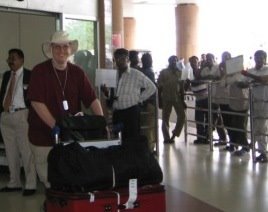
But kisses or no, I was so happy I almost ended up in tears in front of a large group of Tamils. I think they thought I was cute, because a few of them patted me on the back as I made my way through the crowd.
We got to the hotel in no time, and Mo tells me that I ate some dinner, talked to some of her work friends, and then went to bed. I don't remember anything past the front doors of the hotel though, and so I'll end my tale there: 3:45 on Thursday August 4 – 48 hours after it started.
